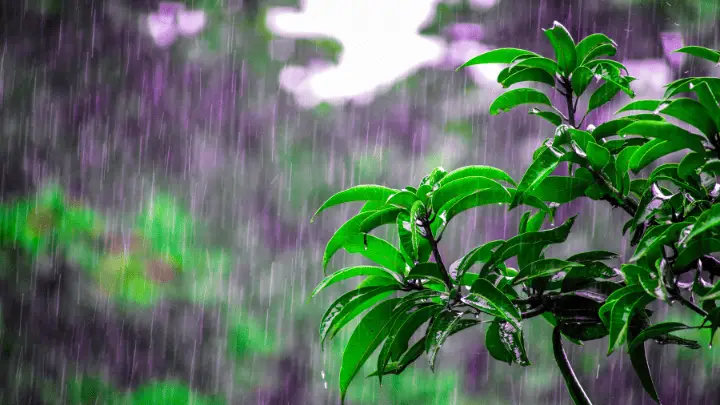Rain is a simple act of nature, yet it plays an indispensable role in sustaining life on Earth. It nourishes our planet, replenishing water sources, aiding in plant growth, and maintaining the delicate balance of our ecosystems. But what would happen if it stopped raining?
This article delves into this hypothetical scenario, exploring the profound implications of a world without rain. In this thought experiment, we will examine the potential consequences on our environment, biodiversity, agriculture, and climate if rain were to cease.
Get ready to explore and understand the importance of rainfall, and imagine a hypothetical scenario where it does not occur.
The Role of Rainfall in Ecosystems

To understand what would happen if it stopped raining, it is important to first address why the ecosystem needs rainfall in the first place.
1. Importance of rain for agriculture and food production
Rainfall plays a crucial role in agriculture and food production. It is the primary source of water for crops and livestock. Without adequate rainfall, crops cannot grow, leading to lower yields and potential food shortages.
Rainwater helps in the dissolution and distribution of nutrients in the soil, which are essential for plant growth. It also aids in the process of photosynthesis, which is vital for crop development.
2. Impact on natural ecosystems and biodiversity
Rainfall has a significant impact on natural ecosystems and biodiversity. It provides the necessary water resources for all forms of life.
In forest ecosystems, for example, rainfall contributes to the health and diversity of the plant species. This, in turn, supports a wide range of animal species.
Wetlands, which are among the most productive ecosystems on the planet, rely heavily on regular rainfall to maintain their unique flora and fauna.
3. Regulation of temperature and climate patterns
Rainfall also plays a key role in regulating temperature and climate patterns. It helps to distribute heat around the Earth’s surface. When it rains, the atmosphere cools down, reducing the temperature.
This is because the process of evaporation and condensation of water involves the transfer of heat energy. On a larger scale, rainfall patterns are a critical component of the Earth’s climate system. Changes in these patterns can have far-reaching effects on global climate and weather patterns.
In conclusion, rainfall is not just a weather phenomenon. It is a vital part of our ecosystems, contributing to agriculture, biodiversity, and climate regulation. Its importance cannot be overstated, and understanding its role is crucial for our survival and the health of our planet.
What Would Happen if it Stopped Raining?
If it stopped raining everywhere, the consequences would be severe and far-reaching. Here’s a summary of what could happen:
The ecological impact of what would happen if it stopped raining
1. Drought-stricken lands
In a rainless world, vast stretches of land would succumb to drought, disrupting ecosystems and endangering countless plant and animal species. The absence of precipitation would lead to depleted soil moisture, hindering plant growth and triggering desertification in arid regions.
2. Disrupted water cycles
Without rain to replenish freshwater sources such as rivers, lakes, and aquifers, water scarcity would become a pervasive issue.
The disruption of the water cycle would not only affect terrestrial habitats but also jeopardize aquatic ecosystems, threatening the survival of aquatic flora and fauna.
3. Increased wildfire risk
With dry conditions prevailing, the risk of wildfires would escalate dramatically. Without rainfall to dampen the landscape, even minor sparks could ignite catastrophic blazes, ravaging forests, grasslands, and urban areas alike.
Societal impacts of what would happen if it stopped raining
1. Agricultural crisis
Agriculture, heavily reliant on adequate rainfall for crop cultivation, would face a severe crisis in a rainless world. Crop failures would be rampant, leading to food shortages, escalating prices, and economic instability. Farmers would struggle to adapt to the arid conditions, exacerbating rural poverty and migration.
2. Water scarcity and conflict
As freshwater sources dwindle, competition for remaining water supplies would intensify. Nations, communities, and individuals would vie for access to limited resources, potentially sparking conflicts and exacerbating geopolitical tensions. Efficient water management and conservation efforts would become paramount for societal resilience.
3. Health impacts
The absence of rain could also impact public health in numerous ways. Reduced agricultural productivity could lead to malnutrition and food insecurity, particularly in vulnerable populations.
Moreover, stagnant water bodies resulting from decreased precipitation could become breeding grounds for disease vectors. This could exacerbate vector-borne illnesses such as malaria and dengue fever.
Economic consequences of what would happen if it stopped raining
Impact on industries
Various industries, including tourism, hydroelectric power generation, and outdoor recreation, would suffer significant setbacks in a rainless world. Tourism-dependent regions known for their natural beauty and outdoor attractions would experience a decline in visitor numbers due to altered landscapes and diminished recreational opportunities.
Infrastructure challenges
Infrastructure designed to manage and mitigate the effects of rainfall, such as stormwater drainage systems and flood barriers, would become obsolete in a rainless environment.
Repurposing or retrofitting such infrastructure to address new challenges posed by water scarcity would entail substantial costs and logistical hurdles.
Innovation and adaptation
In the face of a world without rain, the consequences would be dire, and the challenges would be significant. However, despite the difficulties, there would also be opportunities for innovation and adaptation.
With a focus on scientific advancements in water-efficient agriculture and renewable energy technologies, it is possible to mitigate some of the adverse effects of drought. Additionally, advancements in desalination processes can also help alleviate water scarcity.
These advancements would not only provide solutions to current challenges but also foster resilience and sustainability in the face of future environmental changes. For instance, water-efficient agriculture would enable farmers to grow crops using less water, reducing the amount of water required to irrigate farms.
In addition, renewable energy technologies can reduce dependency on fossil fuels, which consume vast amounts of water to generate power. Finally, desalination processes could transform saltwater into freshwater, providing communities with a reliable source of drinking water.
All these measures would help to ensure that the world can adapt to a rainless future while still maintaining a sustainable and livable environment for everyone.
FAQs
What would happen to aquatic ecosystems in a rainless world?
In the absence of rainfall, aquatic ecosystems would suffer from dwindling water levels, habitat loss, and reduced biodiversity. Many species adapted to freshwater habitats would face extinction, disrupting entire food chains.
How would urban areas cope with water shortages?
Urban areas would implement stringent water conservation measures, such as recycling wastewater, implementing water-saving technologies, and promoting xeriscaping. Additionally, authorities may resort to water rationing and price incentives to curb consumption.
Could artificial rain be a solution to mitigate the effects of a rainless world?
Artificial rainmaking techniques, such as cloud seeding, have been proposed as a potential solution to induce precipitation in water-stressed regions. While promising, the effectiveness and environmental impacts of such methods remain subject to debate and further research.
Would a rainless world lead to climate change?
The absence of rainfall would undoubtedly alter local and regional climates, potentially exacerbating existing climate change trends. However, the global implications of a rainless world on broader climate patterns require comprehensive study and analysis.
How would wildlife adapt to a rainless environment?
Wildlife would undergo significant behavioral and physiological adaptations to cope with the challenges of a rainless world. Species capable of migrating to more hospitable habitats or adjusting their water and food sources would have a higher chance of survival.
Final Thoughts
In this article, you’ve explored the catastrophic consequences of a world without rain. From water scarcity and loss of vegetation to the extinction of animal species and drastic climate change, the effects would be far-reaching and devastating.
The economic impact would also be significant, with agriculture and food production severely affected. This hypothetical scenario underscores the urgent need for proactive measures to protect and preserve our water resources. It’s a call to action for each one of us.
Whether it’s reducing water waste, investing in sustainable water technologies, or advocating for policies that protect our water resources, every effort counts. Rain is more than just a weather phenomenon. It’s a life-giving force that sustains our ecosystems and biodiversity.
It regulates our climate and plays a crucial role in our agriculture and food production. As we reflect on the importance of rain, let’s also remember our role as stewards of our planet’s natural resources.
Our actions today will determine the health and sustainability of our planet for future generations. You can also learn more about why a rainbow appears after rainfall.
Thanks for reading.

